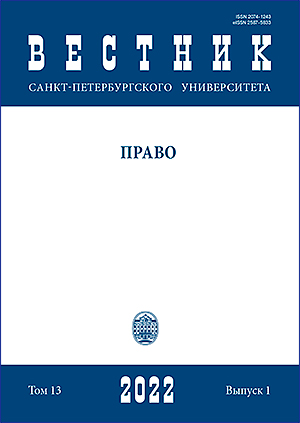Protecting the legitimate expectations of the taxpayer in the context of the operation and application of anti-avoidance rules: Balancing private and public interests
DOI:
https://doi.org/10.21638/spbu14.2022.105Abstract
The article analyzes General and Special Anti-Avoidance Rules of national and international law. The authors investigate the correlation between General and Special Anti-Avoidance Rules established in Russian tax legislation, and also determine the place of judicial doctrines and official interpretations of legislative anti-avoidance rules in the mechanism of law enforcement. Given the multiplicity of legal prescriptions, judicial positions and interpretation acts, a sequence of application of legal provisions in the resolution of litigation is being developed. The correlation of international anti-avoidance rules with the rules of Russian tax legislation is established, indicating the dominant role of the provisions of the Constitution of the Russian Federation and legal positions of the Constitutional Court of the Russian Federation in the system of anti-avoidance orders, including international treaties. A system and hierarchy of anti-avoidance norms are proposed. Special attention is paid to the study of the principle of protection by taxpayers of their legitimate expectations as a guarantee of ensuring private interest in the field of tax relations. The exercise by taxpayers of the right to protect their legitimate expectations is viewed in the context of their obtaining a reasonable tax benefit. A study of tax calculation methods, including the calculation method used to determine the amount of tax benefit in the context of taxpayers’ protection of their legitimate expectations to reduce tax burden, is conducted. The idea is expressed about the need to legislatively recognize the taxpayer’s right to independently use the tax calculation method, especially in unforeseen circumstances. The judicial approach is supported that the protection of property tax consequences expected as a result of completed transactions can be conducted in court, based on the initial legal expectations, despite the taxpayer’s compliance with the instructions of the tax authority to pay arrears, penalties and fines.
Keywords:
tax evasion, anti-avoidance tax rules, double taxation, egitimate taxpayer expectations, tax planning, tax benefit, unreasonable tax benefit, calculation method
Downloads
References
Downloads
Published
How to Cite
Issue
Section
License
Articles of "Vestnik of Saint Petersburg University. Law" are open access distributed under the terms of the License Agreement with Saint Petersburg State University, which permits to the authors unrestricted distribution and self-archiving free of charge.






